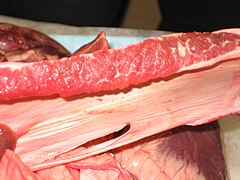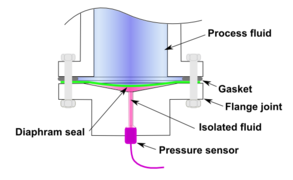diaphragm
Jump to navigation
Jump to search
English[edit]
Etymology[edit]
From Ancient Greek διάφραγμα (diáphragma, “partition”), from διά (diá, “across”) and φράγμα (phrágma, “barrier”), from the verb φράσσω (phrássō).
Pronunciation[edit]
Noun[edit]
diaphragm (plural diaphragms)
- (anatomy) In mammals, a sheet of muscle separating the thorax from the abdomen, contracted and relaxed in respiration to draw air into and expel air from the lungs; also called thoracic diaphragm.
- (anatomy) Any of various membranes or sheets of muscle or ligament which separate one cavity from another.
- A contraceptive device consisting of a flexible cup, used to cover the cervix during intercourse.
- (mechanics) A flexible membrane separating two chambers and fixed around its periphery that distends into one or other chamber as the difference in the pressure in the chambers varies.
- (acoustics) In a speaker, the thin, semi-rigid membrane which vibrates to produce sound.
- (optics, photography) A thin opaque structure with a central aperture, used to limit the passage of light into a camera or similar device.
- (chemistry) A permeable or semipermeable membrane.
- 1921, Wilder Dwight Bancroft, Applied Colloid Chemistry: General Theory[1], page 207:
- The mass of liquid transported through a porous diaphragm in a given time is directly proportional to the current.
- (construction) A floor slab, metal wall panel, roof panel or the like, having a sufficiently large in-plane shear stiffness and sufficient strength to transmit horizontal forces to resisting systems.
Derived terms[edit]
Translations[edit]
anatomy: sheet of muscle separating thorax from abdomen
|
anatomy: separating membrane or sheet of muscle
contraceptive device
|
mechanics: flexible membrane
|
acoustics: vibrating membrane in a speaker
|
optics: structure with a central aperture used to limit the passage of light
|
chemistry: permeable or semipermeable membrane
construction: stiff floor slab etc.
- The translations below need to be checked and inserted above into the appropriate translation tables. See instructions at Wiktionary:Entry layout § Translations.
Verb[edit]
diaphragm (third-person singular simple present diaphragms, present participle diaphragming, simple past and past participle diaphragmed)
- (optics, photography) To reduce lens aperture using an optical diaphragm.
- 1870, D. Appleton & Co., Appletons' Annual Cyclopædia and Register of Important Events of the Year 1869[2], page 43:
- He employs an equatorial with an object-glass having a focal length of five metres, and which was diaphragmed down to eight centimetres.
- To act as a diaphragm, for example by vibrating.
Translations[edit]
optics: to reduce lens aperture
|
Gallery[edit]
-
The thoracic diaphragm.
-
A mechanical diaphragm.
-
An acoustic diaphragm.
Categories:
- English terms derived from Ancient Greek
- English 3-syllable words
- English terms with IPA pronunciation
- English terms with audio links
- English lemmas
- English nouns
- English countable nouns
- en:Anatomy
- en:Mechanics
- en:Acoustics
- en:Optics
- en:Photography
- en:Chemistry
- English terms with quotations
- en:Construction
- English verbs
- en:Birth control
- en:Muscles



